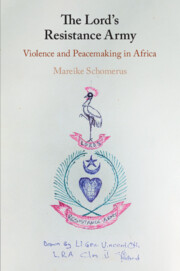Book contents
- The Lord’s Resistance Army
- The Lord’s Resistance Army
- Copyright page
- Contents
- Figures
- Acknowledgements
- Note on the Text
- Abbreviations and Acronyms
- 1 Introduction
- 2 The Lord’s Resistance Army
- 3 The Juba Peace Talks with the Lord’s Resistance Army in 2006
- 4 ‘Am I an Animal?’
- 5 The Juba Peace Talks with the Lord’s Resistance Army in 2007
- 6 ‘Reach Out a Hand and Pull It Back’
- 7 The Juba Peace Talks with the Lord’s Resistance Army in 2008
- 8 ‘LRA Has Already Become a System’
- 9 ‘We Are All Learning in This Peace Process’
- References
- Index
3 - The Juba Peace Talks with the Lord’s Resistance Army in 2006
‘While Talking, There Is Troop Movement’
Published online by Cambridge University Press: 09 April 2021
- The Lord’s Resistance Army
- The Lord’s Resistance Army
- Copyright page
- Contents
- Figures
- Acknowledgements
- Note on the Text
- Abbreviations and Acronyms
- 1 Introduction
- 2 The Lord’s Resistance Army
- 3 The Juba Peace Talks with the Lord’s Resistance Army in 2006
- 4 ‘Am I an Animal?’
- 5 The Juba Peace Talks with the Lord’s Resistance Army in 2007
- 6 ‘Reach Out a Hand and Pull It Back’
- 7 The Juba Peace Talks with the Lord’s Resistance Army in 2008
- 8 ‘LRA Has Already Become a System’
- 9 ‘We Are All Learning in This Peace Process’
- References
- Index
Summary
This chapter gives a detailed and dramatic account of the first year of the Juba Peace Talks between the Lord’s Resistance Army/Movement (LRA/M) and the Government of Uganda. It highlights the many tensions and contradictions that occurred, for example, the pressure to bring LRA senior commanders to the table while they feared for their security, Ugandan government insistence to put a deadline on the talks, the lack of capacity within the LRA/M delegation to deliver negotiation papers, the technical and military challenge to have the LRA fighters assemble, the contradictions within international approaches that simultaneously supported the ICC while also requesting that to back off. Ownership of the process became complex for the LRA/M who sought broad civil society participation while aiming to maintain their powerful hold on the process. In offering a narrative of the convoluted and complex events of this first year of peace talks, the chapter also argues that the developing dynamics of the talks made the pursuit of peace not just an unthankful but rather a damaging experience: For the LRA/M, the start to the negotiations was an experience of continuation, with existing political and military power relations entrenched, rather than transformed.
Keywords
- Type
- Chapter
- Information
- The Lord's Resistance ArmyViolence and Peacemaking in Africa, pp. 70 - 110Publisher: Cambridge University PressPrint publication year: 2021



